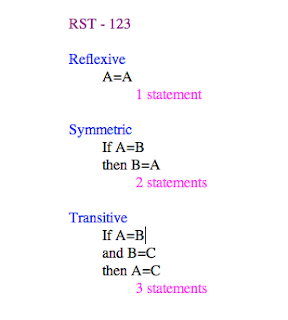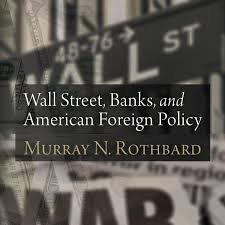Technocratic thinking permeates to a certain degree throughout the political factions in one way or the other, including libertarians. It is not the spouting about the Non-aggression principle that irritates the technocrat. The principle is as much an objectivist principle as it is an Austrian one going all the way back to the classical liberals of Locke ( or Loki as Andy Warski would say). Plus, at the lowest level, and without scaling out to “society”, I suspect most people would have no issue with the principle as given.
No, it is the axiom of Human action, the starting point of the Austrians. It is analogous to the reflexive property of Equality (a=a) that is the starting point of algebraic proofs.

Still, what does all this have to do with banking or technocracy for that matter? Murray Rothbard, a famous Austrian economist, illustrates the true relationship of banking in the book, Wall Street, Banks, and American Foreign Policy. His chain of reasoning that leads up to this point can be found in his books on the nature of money and economics. The statements, on page 1 no less, are presented is as follows:
“
Commercial bankers, engaged as they are in unsound fractional reserve credit, are, in the free market, always teetering on the edge of bankruptcy. Hence they are always reaching for government aid and bailout.
Investment bankers do much of their business underwriting government bonds, in the United States and abroad. therefore, they have a vested interest in promoting deficits and in forcing taxpayers to redeem government debt. Both sets of bankers, then, tend to be tied in with government policy, and try to influence and control government actions in domestic and foreign affairs.
”

In other words, if you have these types of banks there always be a partnership between government and banks.
The whole book goes on to prove that this has been a fact from the civil war period on to the present. He names many powerful people throughout the period and the factions that they belong that have had a powerful influence on both parties and newspapers, displaying that the whole system is a scam operation.
So, why is this an irritant to the utopian idiots?
Firstly, with this type of banking arrangement, he inadvertently arrives axiomatically from a different perspective to the same conclusion as the Iron Law of Oligarchy. Murray Rothbard doesn't have to assign any motive or a type of conspiracy theory to come to this conclusion. It is natural as the substitution principle.
Contrary to what delusional and retarded progressives believe, government and banks are not in opposition of each other. They have never been and they never will. In fact, they have a very fruitful partnership. The only “rich” people that progressives will affect is the dude who owns a few franchise stores of McDonald's or a local shop owner. Rothbard demolishes the progressive technocrats spiritual belief in the Holy State; they are a walking contradiction. They are no different than reactionaries and traditionalists, who give a spiritual meaning to the abstraction of the state. Speaking of which, patriots have their own kind of delusion, but it's usually not a technocratic one. Nation Building by the military industrial complex perhaps, as touched upon Nassim Nicholas Taleb’s book, Skin in the game. Technocrats don't like him very much either.
Lastly, it follows that this banking arrangement would eventually lead to something like the technocratic managerial state and not “free markets”. The Cato types can throw as many stats to virtue signal how “scientific” they are, but there won't be any kind of libertarian society without removing these global banking parasites. America has the largest bureaucracy in the history of the planet with no signs of shrinking, yet they throw stats out as if the current state of America is a “free market”. It really is no wonder that the Cato Institute, who wanted to take more of the technocratic Chicago school direction, pushed out Murray Rothbard and despise the Austrians to this day.